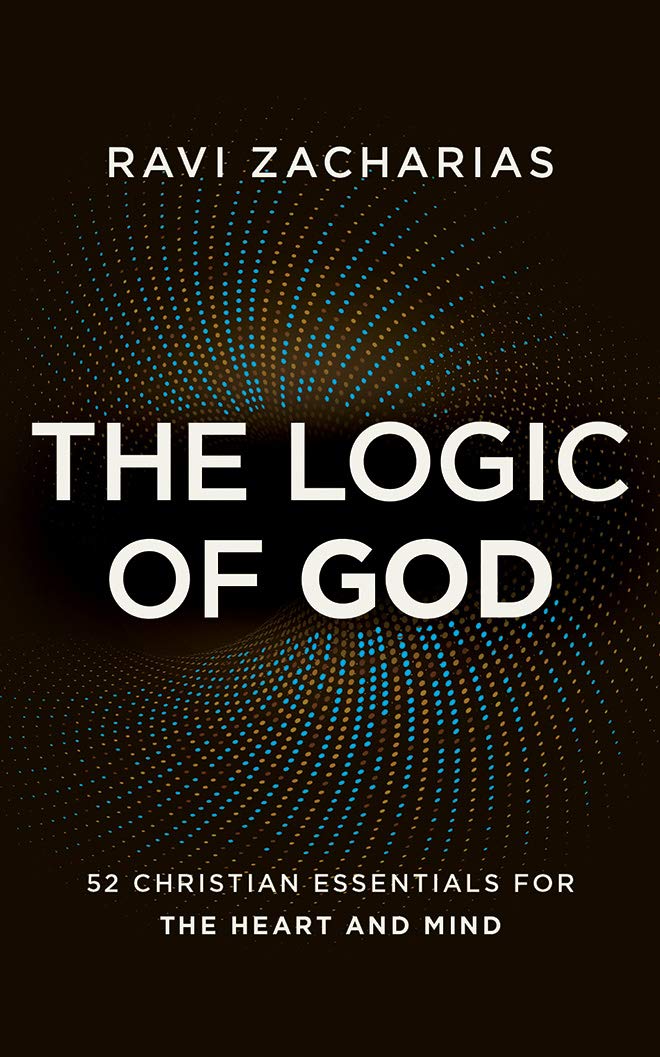
The Logic of God by Ravi Zacharias is an awesome way to evaluate the essentials of Christianity for a new believer or for someone who has followed the Lord for a long time. I found these readings to be a valuable way to evaluate both my heart and my mind. The way that Ravi wrote this book, he intended for it to be ready more like a devotional or other study that is considered on a weekly basis…thus the 52 sections to correspond with 52 weeks in a year. I was on vacation when I first picked this up and read it from cover to cover because the “conversation” was so engaging. I should also mention that I read this about a week after Ravi passed away and I was doing my best to listen to and read as much as I could that he had written or shared. What a blessing to read The Logic of God and be reminded of Ravi’s heart for ministry to help “The thinker believe and the believer think.”
I highlighted several things while reading and posted those notes below…
- Life’s four essential questions—origin, meaning, morality, and destiny. Location: 114
- Having had deep questions myself, I listen carefully to the questions raised. I always bear in mind that behind every question is a questioner. The convergence of intellectual and existential struggles drives a person to a brutal honesty in the questions he or she has. Location: 150
- A worldview basically offers answers to four necessary questions: origin, meaning, morality, and destiny. In turn, these answers must be correspondingly true on particular questions and, as a whole, all answers put together must be coherent. Location: 156
- Taking it a step further, the three tests for truth must be applied to any worldview: logical consistency, empirical adequacy, and experiential relevance. Location: 158
- I position the sequence of fact and deduction in the following way: love is the supreme ethic. Where there is the possibility of love, there must be the reality of free will. Where there is the reality of free will, there will inevitably be the possibility of sin. Where there is sin, there is the need for a Savior. Where there is a Savior, there is the hope for redemption. Only in the Judeo-Christian worldview does this sequence find its total expression and answer. The story from sin to redemption is only in the gospel with the ultimate provision of a loving God. Location: 165
- A starting point for taking on the responsibility of the work of Christian apologetics is recognizing the role that living out a disciplined Christian life plays. Even a brief examination of the Scriptures reveals this striking imperative: one may not divorce the content of apologetics from the character of the apologist. Apologetics derives from the Greek word apologia, “to give an answer.” First Peter 3:15 gives us the defining statement: “In your hearts revere Christ as Lord. Always be prepared to give an answer [apologia] to everyone who asks you to give the reason for the hope that you have. But do this with gentleness and respect.” Location: 196
- The British evangelist Rodney “Gipsy” Smith once said, “There are five Gospels: Matthew, Mark, Luke, John, and the Christian, but most people will never read the first four.” Location: 205
- Truth by definition is exclusive. Everything cannot be true. If everything is true, then nothing is false. And if nothing is false, then it would also be true to say everything is false. Location: 252
- Although we wish to avoid it, the pathway of pain can be the means to recognizing our own finitude and the rescuing grace of a God so longing to reach us that He was willing to suffer pain Himself. Location: 310
- God’s answers to life’s questions are not just proven by the process of abstract reasoning; they are also sustained by the rigors of experience. Location: 344
- One of my favorite authors, A. W. Tozer, once observed: I have often wished that there were some way to bring modern Christians into a deeper spiritual life painlessly by short easy lessons; but such wishes are vain. No shortcuts exist! . . . May not the inadequacy of much of our spiritual experience be traced back to our habit of skipping through the corridors of the kingdom like little children through the marketplace, chattering about everything but pausing to learn the true value of nothing? Location: 505
- To echo Charles Spurgeon, the study of God is the highest science, the loftiest pursuit, and the mightiest discipline. Location: 528
- Tozer concluded, “God has not bowed to our nervous haste nor embraced the methods of our machine age. It is well that we accept the hard truth now: the man who would know God must give time to Him!” Location: 530
- For any skeptic, the answers to questions are not enough; he or she looks deeper, to the visible transformation of the one offering them. Location: 1,046
- “Because I live, you also will live.” JOHN 14:19 Location: 1,122
- If an ordinary weaver can create out of a collection of colored threads a garment that will beautify the face, can the Grand Weaver not have a design in mind for you, a design that will adorn you, as He uses your life to fashion you, using all the threads He has within His reach? A purposeful design emerges when the Father weaves a pattern from what to us may often seem disparate threads. Location: 1,143
- Questioning is the way of humanity. We will always ask, debate, challenge, and search. Location: 1,284
- Dying to self and personal glory is the starting point to really living. Augustine said it best: “You have made us for yourself and our hearts are restless until they find their rest in thee.” Location: 2,636
- You will keep in perfect peace those whose minds are steadfast, because they trust in you. Trust in the LORD forever, for the LORD, the LORD himself, is the Rock eternal. ISAIAH 26:3–4 Location: 2,670
- Christ’s sacrifice was meant for our salvation. Our sacrifice is meant for His service. Location: 2,816


